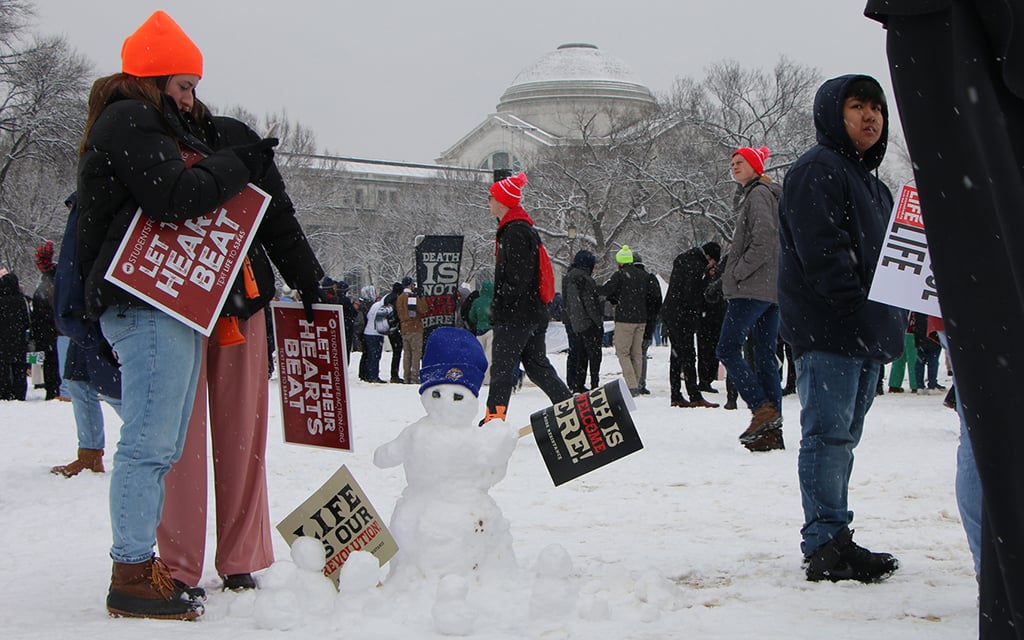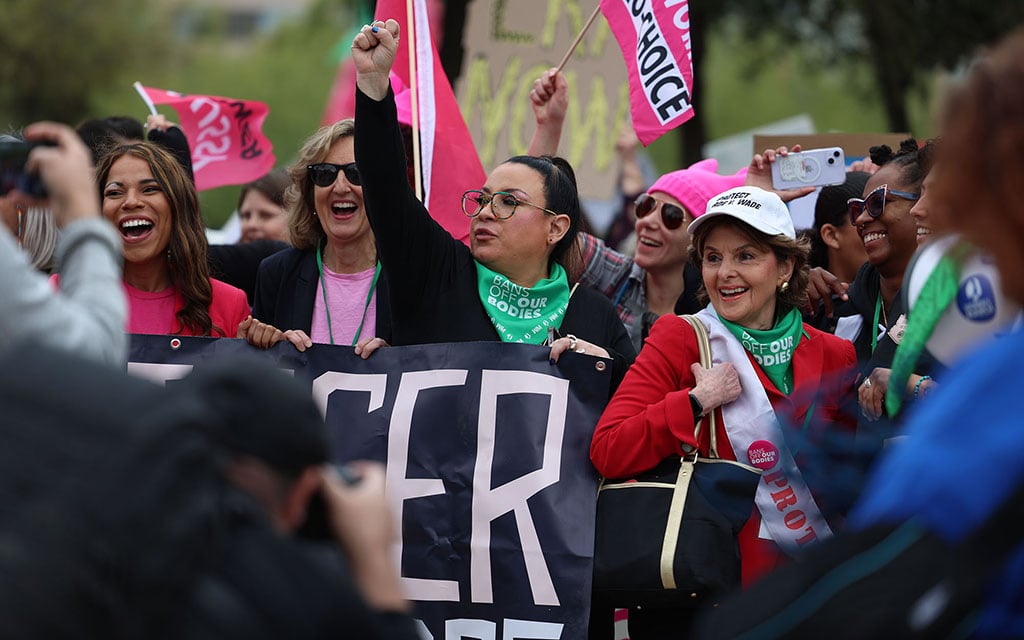
Abortion-rights supporters prepare to march to the Arizona Capitol at the start of Saturday’s Bigger Than Roe National Women’s March. (Photo by Marnie Jordan/Cronkite News)
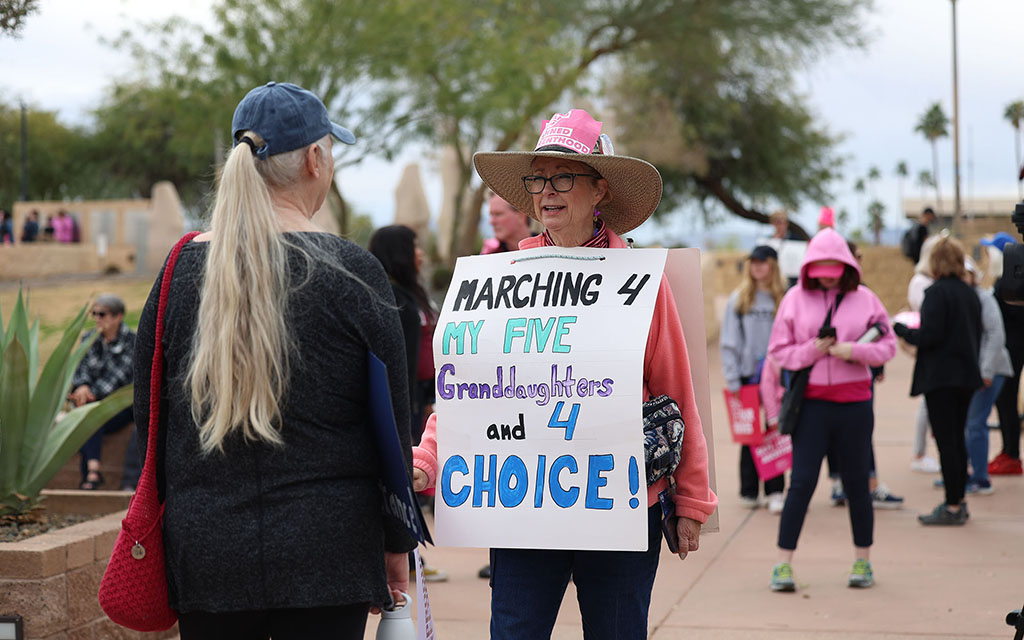
Phoenix resident Connie Campbell Henry, 69, said she remembers fighting for abortion rights in the 1970s, before Roe v. Wade, and is fighting again for the next generations of women. (Photo by Marnie Jordan/Cronkite News)
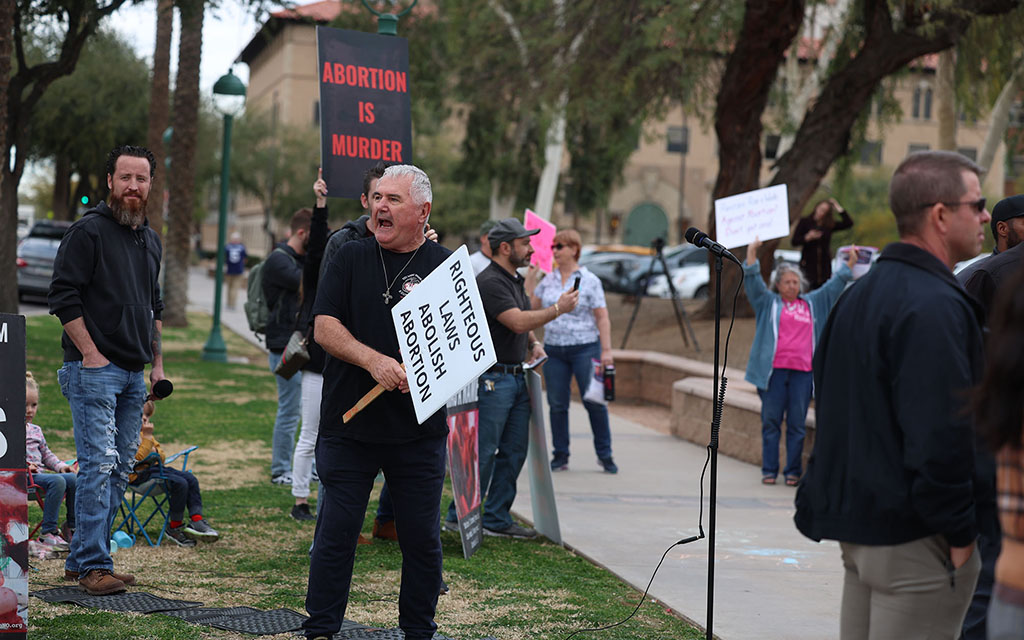
Arizona currently allows abortion up to 15 weeks of pregnancy – down from about 26 weeks before the Dobbs ruling – but opponents are arguing that it should be banned entirely under a 19th century law they say is still in effect. (Photo by Marnie Jordan/Cronkite News)
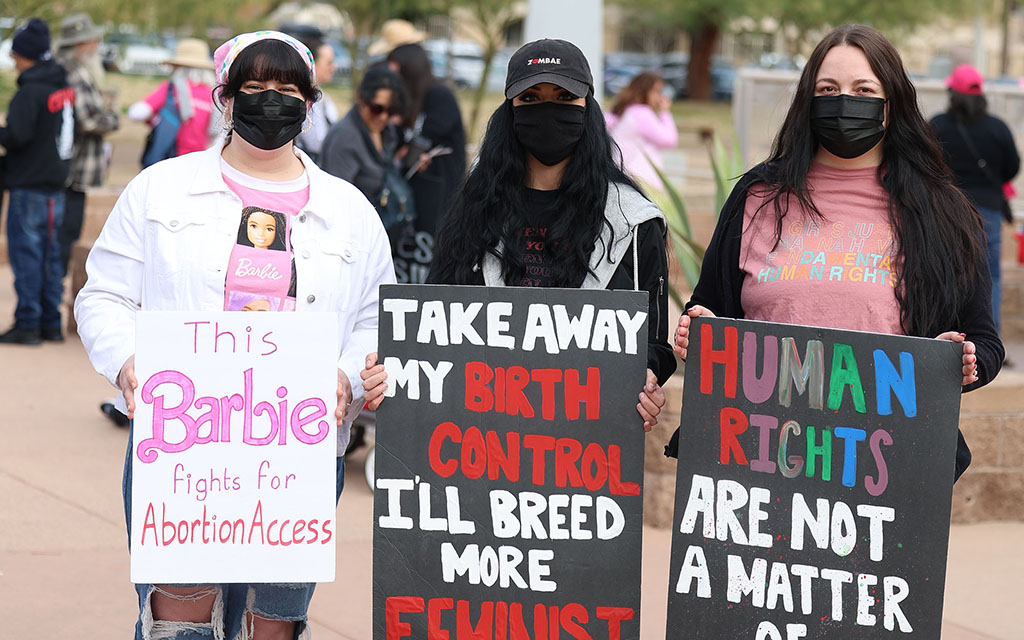
From left, Alexa Cosentino, 21, Melanie Thiebert, 25, and Lauren Collins, 26, say the reversal of Roe motivated them and they are marching to fight for women’s rights. (Photo by Marnie Jordan/Cronkite News)
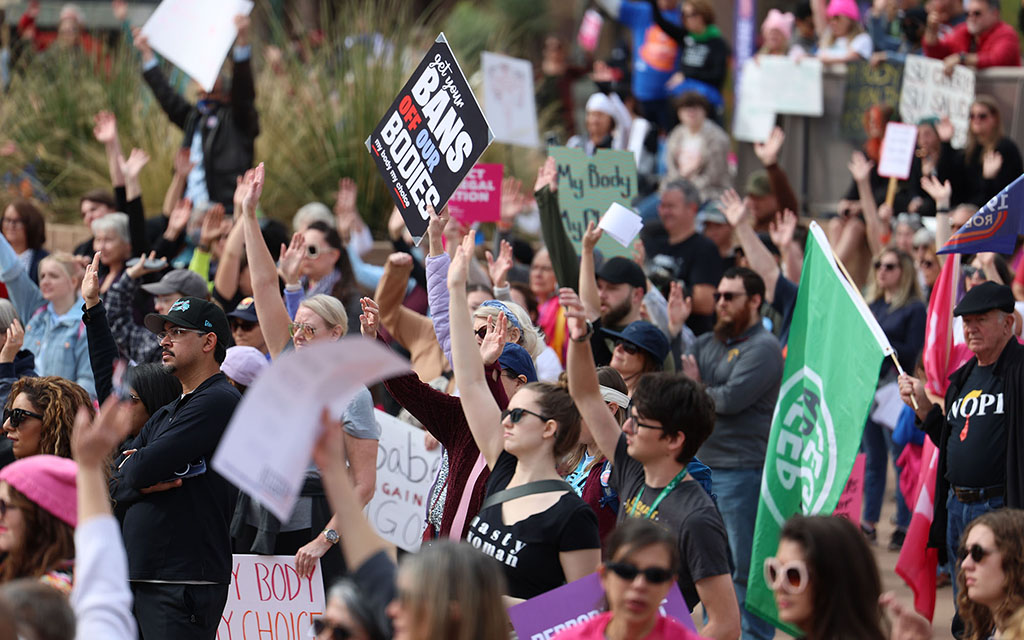
The crowd of abortion-rights supporters packed Wesley Bolin Memorial Plaza outside the state Capitol for Saturday’s march, which came just two days before the anniversary of Roe v. Wade. (Photo by Marnie Jordan/Cronkite News)
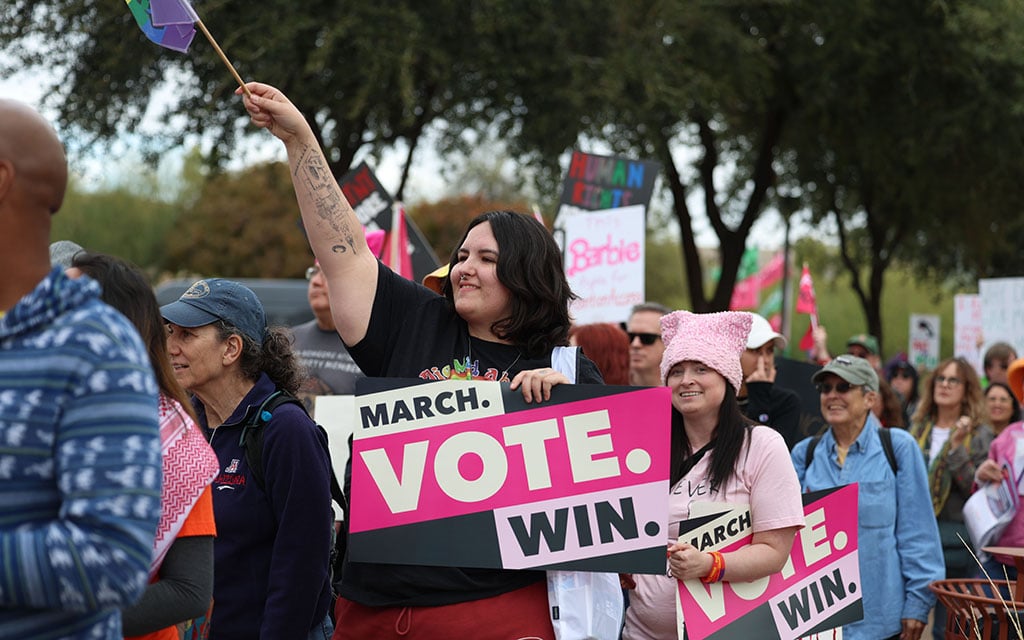
Since the Supreme Court ruled in 2022, in its Dobbs decision, that abortion rights should be left to the states, Arizona has emerged as a major battleground on the issue. (Photo by Marnie Jordan/Cronkite News)
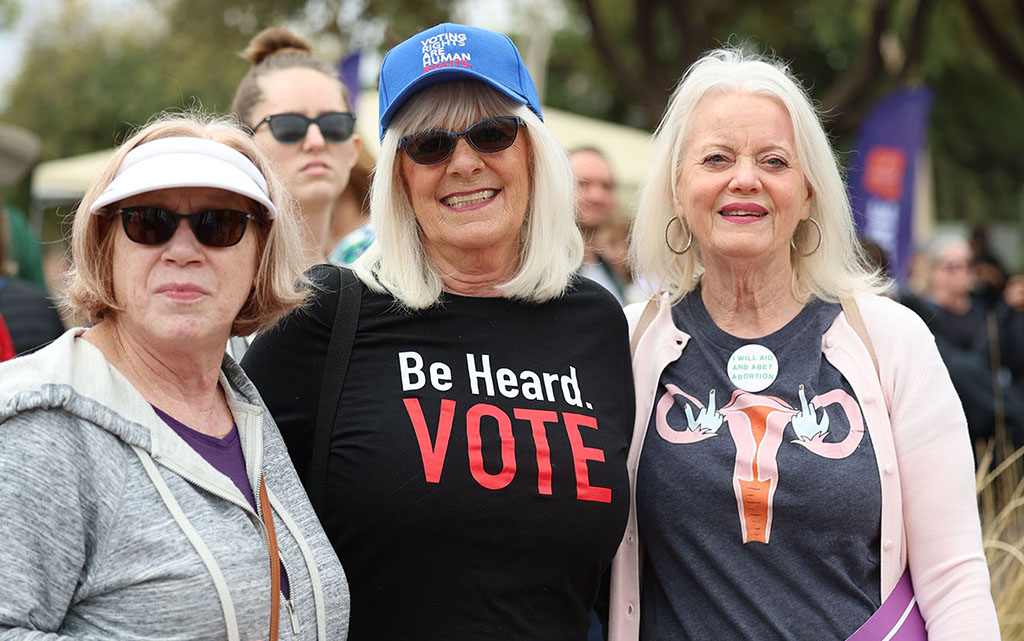
From left, Maureen Dowling, Mary Santy and Jennifer Kimball attended to National Women’s March. Kimball said she fought for abortion rights in the ’70s, and is doing so again now. (Photo by Marnie Jordan/Cronkite News)
PHOENIX – Chanting “bans off our bodies” and “my body, my choice,” protesters marched on the Arizona Capitol Saturday as the National Women’s March was held in Phoenix to highlight the state’s role as the next battleground over abortion.
The chanting, cheering crowd of mostly women included those who fought for abortion rights as well as those who grew up knowing nothing else until the Supreme Court overturned Roe v. Wade in 2022.
“I honestly can’t believe that I’m doing this all over again,” said Jennifer Kimball, 74, a Phoenix resident who recalled advocating for abortion rights in the 1970s when the Supreme Court handed down Roe v. Wade, the decision that recognized abortion as part of the constitutional right to privacy.
On Saturday, Kimball – wearing a shirt with an image of a uterus with hands holding up two middle fingers – was collecting petition signatures for a ballot initiative that would amend the Arizona Constitution to protect the right to abortion.
The march came just two days before the anniversary of the ruling in Roe, which was overturned by the Supreme Court in June 2022 with its decision in Dobbs v. Jackson Women’s Health. That ruling said the question of abortion rights should be left to the states.
Organizers of the Bigger Than Roe National Women’s March said Arizona is the next battleground in that state-level fight, which is why the Phoenix march was designated as the national march out of more than 100 events around the country to mark the anniversary of Roe.
While some states have reverted to abortion bans and others have successfully passed abortion protections, the law in Arizona is up in the air after almost two years of legal wrangling in the wake of Dobbs.
State lawmakers lowered the threshold for abortions from about 26 weeks before Dobbs to 15 weeks now, except in cases of medical emergency. But abortion opponents argue that a near-total ban on abortion from the 19th century was never taken off the books and should be the law today – an argument the Arizona Supreme Court considered in December and could decide any day.
The proposed constitutional amendment aims to protect abortion no matter what the court rules. Tents with petitions were set up in Wesley Bolin Memorial Plaza before the march and volunteers with clipboards worked the crowd collecting signatures.
Darcy Hill, a spokesperson for Planned Parenthood Advocates of Arizona, said that the initiative had already collected half of the more than 380,000 signatures needed to get it on the ballot, before the enthusiastic crowd lined up at Saturday’s event to sign.
A small group of counter-protesters with a microphone and loudspeaker waited outside the plaza, holding anti-abortion signs and shouting at the marchers. But they were quickly drowned out by the chants of people carrying pink flags and holding signs declaring their bodily autonomy.
Phoenix resident Connie Campbell Henry said she marched in the ’70s in support of Roe and is now marching for her five granddaughters and three daughters-in-law.
“When Roe was overturned, I just cried,” said Henry, 69. “I said we’ve got to go back, we’ve got to go back and fight this. And we did this 50 years ago and it really made me angry. And I’m out here trying to rally women to vote, vote, vote, vote. We are going to do this at the ballot box.”
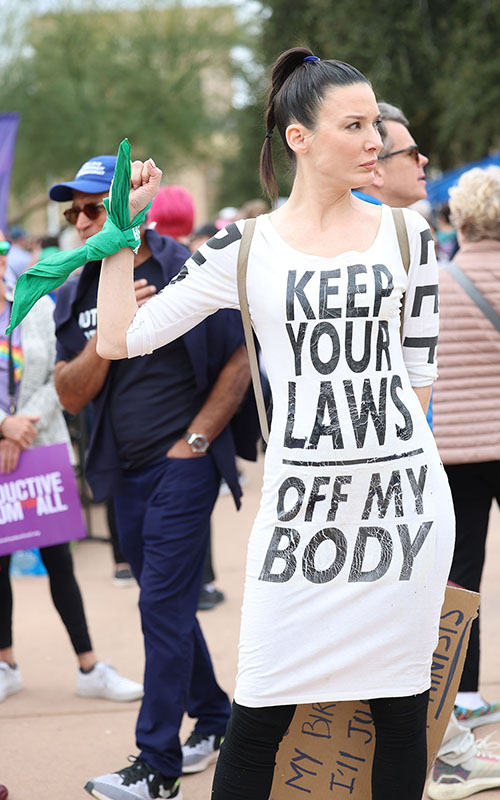
Natalie Sperl, from Los Angeles, wears a “Keep Your Laws Off My Body” dress at the rally. (Photo by Marnie Jordan/Cronkite News)
For Kimball, the issue of abortion is personal: She said she got pregnant pre-Roe, when abortion was illegal in Colorado, and was forced to have a child “that I wasn’t ready to have, didn’t want to have.” She said it changed the trajectory of her life.
“And I have to say that even though my kid is fantastic, and I love him dearly, you know, I’m still pissed off about it after all these years,” she said. “I mean, it’s not the kind of thing you get over, having to give up that control over your body.”
Kimball said she was “heartbroken and devastated” when Roe was overturned, but not surprised, which is why she is fighting to have it enshrined in the state constitution.
“And then hopefully nobody can mess with it after that,” she said. “I guess the Supreme Court said the states are going to have to take this up on their own and that’s what states are doing.”
Alexa Consentino, 21, marched with her friends, Melanie Thiebert, 25, and Lauren Collins, 26. Consentino wore a pink bandana, a Barbie T-shirt and carried a sign that read, “This Barbie fights for abortion access.”
Collins said her initial feelings of anger over Roe’s reversal turned into motivation to raise awareness and make change. Consentino said she felt a mix of frustration and heartbreak when Roe was overturned.
“I think we trusted initially a sense of like that could never happen and when it did, it’s like, how did we get here and how can we fix this?” she said.
All three of the young women said they signed the ballot petition.
“It matters and it’s always mattered, and it’s something that we’ve always felt strongly about and something that I’ve always wanted to support,” Consentino said. “So I’m glad that these things are here in Phoenix and we can be a part of that.”

